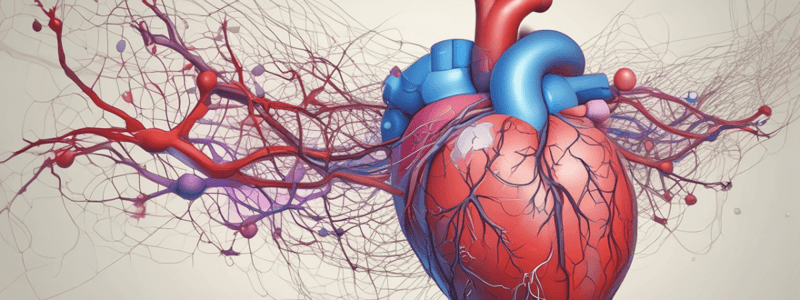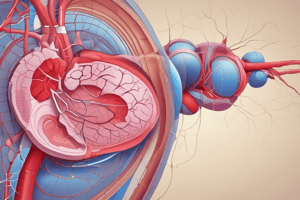Podcast
Questions and Answers
What is the primary role of the renin-angiotensin system in the body?
What is the primary role of the renin-angiotensin system in the body?
- To maintain fluid balance and blood pressure (correct)
- To control digestion and absorption
- To regulate immune system function
- To regulate body temperature
What is the effect of high arterial pressure on renin secretion?
What is the effect of high arterial pressure on renin secretion?
- Renin secretion is inhibited (correct)
- Renin secretion is stimulated
- Renin secretion remains unchanged
- Renin secretion is decreased only slightly
What is the effect of angiotensin II on blood vessels?
What is the effect of angiotensin II on blood vessels?
- It causes blood vessels to relax
- It causes vasoconstriction (correct)
- It causes vasodilation
- It has no effect on blood vessels
What hormone is stimulated by angiotensin II to promote sodium reabsorption and potassium excretion?
What hormone is stimulated by angiotensin II to promote sodium reabsorption and potassium excretion?
What happens when blood pressure decreases?
What happens when blood pressure decreases?
What would be the effect of an ACE inhibitor on blood pressure?
What would be the effect of an ACE inhibitor on blood pressure?
What is the effect of angiotensin II on blood vessels?
What is the effect of angiotensin II on blood vessels?
What is the result of high blood pressure on renin release?
What is the result of high blood pressure on renin release?
What is the primary mechanism of action of ACE inhibitors?
What is the primary mechanism of action of ACE inhibitors?
What is the effect of aldosterone on sodium and potassium in the kidney?
What is the effect of aldosterone on sodium and potassium in the kidney?
What is the ultimate effect of the renin-angiotensin system on blood pressure?
What is the ultimate effect of the renin-angiotensin system on blood pressure?
What is the primary goal of understanding the renin-angiotensin system?
What is the primary goal of understanding the renin-angiotensin system?
Study Notes
The Renin-Angiotensin System: An In-Depth Look at Regulation, Effects, and Control
The renin-angiotensin system (RAS) is a complex hormonal pathway that plays a crucial role in regulating blood volume, electrolyte balance, and systemic vascular resistance. It is responsible for maintaining the body's fluid balance and blood pressure, and its dysregulation can lead to various pathophysiological conditions, such as hypertension, heart failure, and kidney diseases.
Renin Regulation
Renin is an enzyme synthesized and secreted by specialized cells in the kidney called juxtaglomerular cells. Its synthesis is regulated by three main factors: blood pressure, extracellular fluid volume, and the concentration of sodium ions in the extracellular fluid. Renin secretion is inhibited when arterial pressure is high or extracellular fluid volume is excessive, and it is stimulated when arterial pressure is low or extracellular fluid volume is reduced.
Angiotensin II Effects
Angiotensin II is a potent vasoconstrictor that increases blood pressure by causing smooth muscle cells in blood vessel walls to contract. It also stimulates the release of aldosterone, a hormone that promotes sodium reabsorption and potassium excretion in the kidney, which helps maintain electrolyte balance.
Blood Pressure Control
The RAS plays a pivotal role in regulating blood pressure. When blood pressure decreases, the kidney releases renin, which activates the RAS. Angiotensin II, produced by the RAS, causes blood vessels to narrow, which increases blood pressure. In contrast, when blood pressure is high, the kidney releases less renin, which in turn reduces the activation of the RAS and lowers blood pressure.
ACE Inhibitors
Angiotensin-converting enzyme (ACE) inhibitors are a class of medications that block the conversion of angiotensin I to angiotensin II, thereby reducing the effects of angiotensin II on blood vessels and the release of aldosterone. They are commonly used to treat hypertension, heart failure, and other cardiovascular diseases.
Aldosterone Signaling
Aldosterone is a hormone produced by the adrenal cortex in response to the actions of angiotensin II. It promotes sodium reabsorption and potassium excretion in the kidney, which helps maintain fluid and electrolyte balance. Aldosterone also increases blood volume, which in turn increases blood pressure.
In conclusion, the renin-angiotensin system is a complex and multifaceted pathway that plays a crucial role in maintaining fluid and electrolyte balance, regulating blood pressure, and controlling various physiological processes. Understanding the regulation, effects, and control of the RAS is essential for the development of targeted therapies for various pathophysiological conditions.
Studying That Suits You
Use AI to generate personalized quizzes and flashcards to suit your learning preferences.
Description
Understand the complex hormonal pathway of the renin-angiotensin system, its role in regulating blood volume, electrolyte balance, and systemic vascular resistance, and its significance in various pathophysiological conditions.




